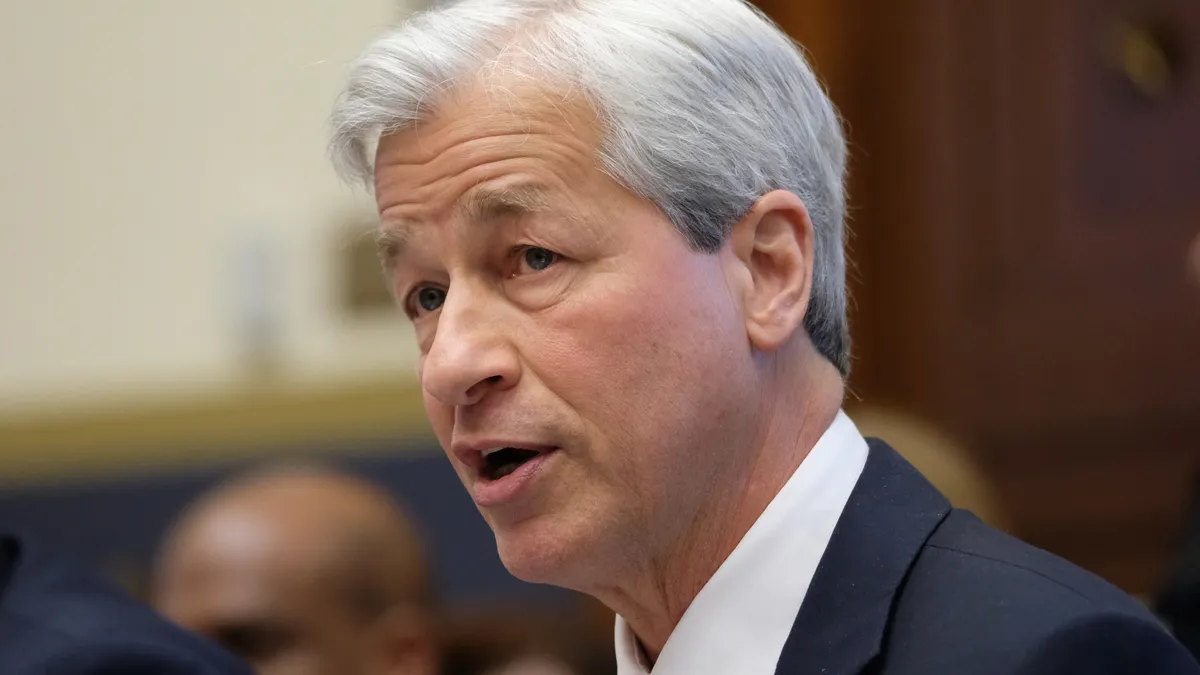Jamie Dimon isn’t the only bank CEO wary of where the economy is headed. Some 85% of bank heads believe the U.S. is headed for recession in the next 12 months, according to data from KPMG’s annual CEO Outlook, which was shared with Banking Dive on Wednesday.
Roughly 60% of the 141 bank CEOs surveyed said the recession would be mild and short. The data comes two days after Dimon, who leads America’s largest bank, JPMorgan Chase, hesitated to guess how long the recession might be.
“It can go from very mild to quite hard, and a lot will be reliant on what happens with [the Russia-Ukraine] war,” he told CNBC on Monday. “So, I think to guess is hard, be prepared.”
About 71% of banking respondents have planned for an upcoming recession, and nearly half (49%) see layoffs in the next six months, the outlook found.
Roughly one-third of bankers said advancing digitization and connectivity across their business is their top operational priority over the next three years, while 20% said their top priority was adapting to geopolitical issues, and another 20% said they sought to increase their employee value proposition to attract top talent.
“The prospects of a possible recession are casting a long shadow and forcing banking executives to focus on strategic growth enablers, with a lens on workforce, [environmental, social and governance] and digitization and connectivity,” said Peter Torrente, KPMG’s U.S. national sector leader for banking and capital markets. “It is a ‘fasten -your-seatbelt’ moment: The leaders who combat economic uncertainty with resilience and an eye toward the long game will be best positioned.”
Despite immediate recessionary woes and worries, 87% of bankers said they are confident in the growth prospects of the U.S. economy over the next three years, and 82% expressed confidence in the growth prospects of their companies.
More than half of bank industry respondents said mergers and acquisitions likely will play into their strategy within the next three years. Another 30% said it “might.”
Will Paige, a research analyst for Insider Intelligence, wrote in August that the market downturn could “create more affordable acquisition targets for firms, but it can also limit their options by cutting their valuations....Profitable and more established companies can capitalize on the harder climate to make cut-price acquisitions.”
Torrente said banking executives “are continuously aware of the M&A implications for their businesses based on a two-pronged approach.”
“On one hand, acquisitions can serve as growth enablers and offer opportunities to expand into new markets and technologies. But, on the flip side, there is increased focus on due diligence and value creation around such activity with recession on the horizon,” he said.
When asked what strategy will be most important for goal achievement in the next three years, bank CEOs ranked strategic alliances with third parties the highest, followed by organic growth by way of tools like innovation, research and development, capital investments, new products and recruitment. Roughly seven in 10 said they have an aggressive digital investment strategy — banks are either buying or launching their own digital tools — aimed at securing first-mover or fast-follower status, KPMG found.
When it comes to hurdles in their business transformation, CEOs said their top three challenges were deciding on the right technology (67%), managing risk and compliance of the transformation (65%) and managing the cultural impact (63%).
As the spotlight continues to shine on ESG, bankers told KPMG that increased or frequently changing regulations and accessing the necessary technology to measure and track ESG initiatives present challenges in delivering on ESG promises. Access to capital to make good on ESG promises also poses a challenge to banks, the survey found.
While the latter challenge may be exasperated if the economy goes into a recession, banking executives can’t lose sight of ESG and its value, Torrente said.
“Pressing the [brakes] on ESG could be costly for brand reputation and stakeholder perception, ultimately casting a shadow on long-term growth,” he said.













